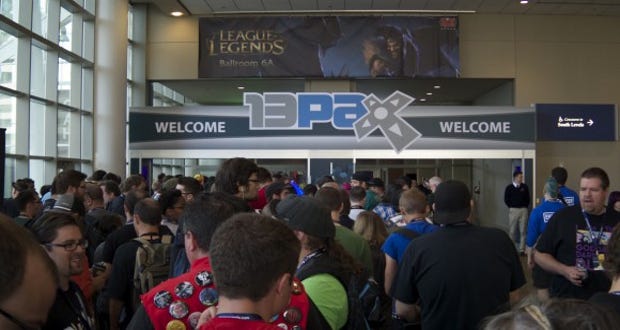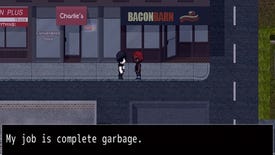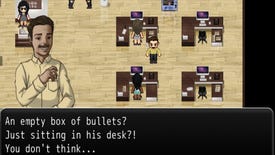To Boycott PAX Or Not To Boycott PAX?
Penny Arcade Vs The People
Editor's note: RPS will no longer be covering PAX events. We believe that the values of the company operating those events conflict with ours, and as such we can no longer endorse their actions by providing coverage of PAX events. An explanation of this can be read here. However, others argue that attending can be an effective way to respond to the company's poor behaviour, and that being there is a way to change things from within. Nathan spoke to people on both sides of the boycott at this year's controversial event.
To Boycott PAX Or Not To Boycott PAX? That really is the question these days, isn't it? The saga, up to this point, has been long, turbulent, and ugly. Penny Arcade's tangled two-headed hydra of a creative force has been at the forefront of some pretty nasty movements over the years - the Dickwolves incident, which saw Mike "Gabe" Krahulik and Jerry "Tycho" Holkins stand resolutely unapologetic over a rape joke that made many fans deeply uncomfortable (instead of saying sorry, they went and sold freaking merchandise), easily stands as the most visible. In the wake of that, similar incidents, and Krahulik acting vocally intolerant of transgender people, Gone Home developer Fullbright - who we spoke to in regards to this article - went so far as to pull out of this year's PAX altogether. But others - many of whom absolutely abhor Penny Arcade's oftentimes turgid stances and values - attended despite all of that. Speaking with developers behind games like Journey, Always Sometimes Monsters, and Child of Light, and other fans and critics from many walks of life, I found out why.
Penny Arcade is one thing. Penny Arcade Expo (PAX) is another.
The two are, of course, inextricably bound by the slimy tendrils of brand synergy, but they are not wholly one-in-the-same. The principle difference? Penny Arcade is two guys. Three if you count business manager Robert Khoo, and many more if you include all of PA's various partners and spin-offs - some of which, like the Child's Play Charity, even do a great deal of good.
But if we're talking sheer numbers, PAX's hooting, hollering, romping, stomping horde positively dwarfs them all. Cramming nearly 100,000 people into comparatively phone booth-like convention centers, PAX Prime, PAX East, and - most recently - PAX Australia have grown into heaving behemoths, beacons for people of all shapes and sizes united under one common interest: games.
Which makes it all the sadder that Penny Arcade's creators - and now, public faces - fail to take responsibility for the wriggly pink things in their mouths. Comedy is nothing without its fangs, certainly, but there's a difference between "telling it like it is" (allegedly for the benefit of others/culture at large, if you follow the rhetoric) and bullying those society tries hardest to stifle. A very big difference.
Boys will be boys, the incredibly outdated saying goes. And in all honesty, Penny Arcade will probably be Penny Arcade. Countless gut-churning incidents followed by halfhearted "apologies" seem to suggest as much. But that's not what those I spoke to attended PAX for in the first place. PAX is a place of the people. Gabe and Tycho's influence can be felt, yes, but again: we're talking 100,000 against two. You do the math. And so, even as the titanic duo's viewpoints grow less and less relevant, PAX remains tremendously important as a point of contact between so, so, so very many voices, ideals, thoughts, hobbies, backgrounds, and - most importantly of all - human beings.
Bad, harmful messages can proliferate there, but so can incredibly powerful forces for good. So then, should we stay or should we go?
The Fullbright Company's Steve Gaynor had already decided the jig was up: "So basically for us, dropping out of PAX was not about any isolated incident," explained Gaynor, "but about a pattern that had been established by those guys that clearly wasn't going to change. And as we saw at PAX Prime this year, that pattern continued. So we don't regret our decision at all."
The decision for any indie games company to ignore PAX is a tough one, not least because of the PR gravity of the PAX event. But Gaynor argues that it can never matter enough: "No one event is going to make or break you," said Gaynor. "If you don't want to support an organization by appearing at their event and associating your game with their brand, you don't have to." Indeed, Gone Home's success - over 50,000 units so far - demonstrates that PAX is not crucial to indie success. Gaynor sees this as significant: "I hope that on some level we can be one example of indie success without supporting something you don't agree with philosophically, morally, etc. That sense of helplessness and inevitability, of the assumption that you have no choice but to show at PAX if you want to have any hope of making it, just really bums me out, and I hope it goes away really soon."
Others, however, attended the event despite their reservations, and for varied reasons: “We had a direct conversation about [possibly pulling out due to Krahulik's trans-unfriendly diatribe] when we were putting our panel together," admitted former Journey dev Robin Hunicke, who participated in a PAX Prime panel entitled "You Can Make Games Too." "But you can't move the dialogue forward if you step away from the dialogue. So we came here because we wanted to make it known that games are an art form. They're open to a lot of different perspectives. We are an open community. We came here to tell this community that we're open to them. We're open to all communities. You can't say that if you're not here.”
“This is where the audience is, and I wanted to get the audience in and talk with them about making games," said Adorkable Games creative director Ashley Zeldin, who spearheaded the panel. "After the whole issue that happened with Penny Arcade, I thought of pulling out. I decided not to because this conversation needs to happen here. I don't need to agree with the organizers' message to get a good message across to the people who are attending."
"This is the biggest customer-facing game expo. This isn't talking to devs. This is talking to the audience we want to reach. These people don't all want Call of Duty 25. They want more games like Journey or Gone Home. They want more games that are different. Different genres, perspectives, types of stories, ways of telling stories."
Game critics/writers Samantha Allen and Holly Green - who both headed up a panel called "Achieving Gender Diversity in Gaming: OK, Now What?" - agreed, noting that attending PAX and staying as far away as physically possible can work hand-in-hand so long as everyone's on the same page about it.
“We came here, we spoke to a couple hundred people, and it was streamed [to many, many more] on Twitch," pointed out Allen. "But I don't think changing systems from within and without are mutually exclusive goals. I mean, every year more and more panels on gender and sexuality are showing up at PAX. Attendance is going up, too. So from within, PAX is becoming more accepting. And at the same time, on the opposite side, people like Fullbright, the Gone Home developers, saying, 'We're not gonna be here,' brings the pressure from without. And I think when both those things are happening simultaneously, either the culture of the event itself is bound to change, or there'll be even more pressure from well-known figures in the industry.”
“I think it was really good for the community for Gone Home's developers to stand their ground," Green added. "Even if it's not what I did, it's still one of those things that sends a clear message. It makes other people in the community feel better, too. We've all been marginalized and shoved to the back time and time again and had to just deal with it. It's nice to see someone stand up for us for once. It felt great. I'm going to support people like that 110 percent – even if I didn't decide to boycott PAX. I'm still going to support their decision, absolutely. It sends a very clear message.”
But even so, spreading these sorts of messages at such a colossal, wide-ranging convention is no small order. For one, many of the folks who need a more personal, face-to-face experience with difference - to stop regarding it as a looming, diabolical concept and start understanding their fellow gamers as human beings - likely won't attend PAX, and even if they pack up their technicolor fedora dream collections and make the trip out, why would they attend panels about movements Internet hate-mongering has taught them to despise?
This, contended Always Sometimes Monsters creative director Justin Amirkhani - whose game allows you to pick your character's gender, race, and sexual orientation and see how a brutally real world reacts - is where the strengths of our medium stand to shine brightest.
“I think making games accessible to everybody is very important in getting messages across – especially if you're trying to [convince people]," he said, looking out from a PAX balcony into a throng of guys, gals, cosplayers, adults, kids, and just about everything else you could imagine. "I'd rather be here providing a game that gives a sort of experience so you understand these sorts of ideas better without alienating anybody. And I really like the idea of being here just in case somebody's feeling alone or alienated. Saying, 'No, we're not a big fan of some of the things that are being said [by Penny Arcade],' but I'd rather be here for people who want to learn.”
“I have found that a lot of times some people don't want to hear me talk about the game beforehand. They just want to hop in and see what it is. Sometimes they're hung up on the choice aspect. Sometimes they're hung up on the situation. But sometimes those people end up playing as a lesbian couple or someone else they'd never be.”
And even panels can have a deceptively large splash radius if you know how to aim them. Zeldin and co, especially, probably deserve some sort of unreasonably hefty brain-shaped trophy.
“I titled it 'You Can Make Games Too' because it's open to everybody," explained Zeldin. "I was hoping it'd be a little bit of a catch-all. I specifically did not really make it geared toward diversity of gender, ethnicity, or sexuality because I didn't want people who were only into that to come. I said in the pitch that people from different backgrounds like psychology or biology can come. I wanted people who had different viewpoints, and then we would kind of subliminally indoctrinate them to be more open to diversity.”
“I made sure that we had more than one woman, and then I wanted to make sure that there was no 'token' person. So then I brought on [Far Cry 3/Child of Light writer] Jeffrey Yohalem, and I realized [freelance designer] Michael Annetta was a great speaker and also happens to be gay. I guess the only token on the panel was [thatgamecompany engineer] John Nesky, who's straight and white,” she laughed.
"But I liked that John pointed out that even when you see the face of the normal, there's always something behind it," Hunicke was quick to add. "Life is a struggle. We all have our challenges. Everyone who looks a certain way definitely doesn't feel the same way on the inside, and they don't get the same opportunities. As long as we can continue to tell the story that diversity is already present in the industry, then we can break the myth that PAX is filled with white guys who don't like gay people or women. That's just a myth. The more we do to collectively destroy that myth and bring the reality of our situation – which is that we're all different and we're all part of the struggle – to light, the better off the industry is. I truly, truly believe that.”
Allen, Green, and co's panel, meanwhile, managed to just sort of appear in one of PAX's main Twitch streams. Was it a lucky break? Absolutely. But that didn't make it any less beneficial.
“We had a panel with multiple openly transgender women - among many others," said Allen, proud. "Everyone in that room and watching that stream was seeing different kinds of bodies and faces within gaming culture.”
“I think that's where the LGBQT community has managed to succeed: putting a face on things," added fellow panelist and games writer Catherine Cai. "What's really upsetting is that trans issues haven't been exposed quite as much as lesbian and gay issues. It's always been like, 'Oh, I know someone who's gay,' because ten percent of the population is gay. But the transgender population is significantly smaller than that. Even someone who's part of the LGBQT community can come in and learn something.”
Regardless, the message is clear. Green drove it home: “This isn't about your Devil's Advocate bullshit. This is about real people.”
But is all of this effort accomplishing anything? That's the question of the hour, and the answer is a muddy morass of encouragement, disappointment, and - yes, once again, because common human decency is apparently far less, you know, common than you'd think - Dickwolves. Krahulik closed out PAX by suggesting that his one big regret was pulling PA's ill-advised official Dickwolves merchandise back in the day, to the agreement of his coworkers and raucous cheers from a crowd of attendees. The scene was bile-gushingly gross, and it reopened a wound time had only just begun to heal. Krahulik later apologized, but the damage had already been done.
"After our discussion at PAX, Catherine, Holly and I were walking back to the convention center when a group of PAX Enforcers stopped us, hugged us and thanked us for the panel. 'We feel like we're really turning a corner this year.' As I rode the train to the airport, I felt like we had done a good thing," Allen told me via email after the show.
"I made the mistake of checking Twitter after I got through security. I read what happened. The fact that Mike said he regretted pulling the merchandise didn't surprise me. But the fact that the audience cheered for his expression of regret made me sick to my stomach. I felt betrayed even though I should have seen it coming. It cast a pall over my entire experience at PAX, even though I was only there in the capacity of supporting feminist and queer panels. That good feeling I had on the train? Gone."
And yet, she, Green, and Cai don't regret attending the show or putting on a panel. Penny Arcade's frontmen might not be changing much, but that's not who all of this effort is for in the first place. Not in the slightest.
"My opinion on the whole 'to boycott or to not boycott' issue is unchanged," said Cai via email. "I think it's necessary for us to be there. As Holly and Samantha both mentioned, PAX has become a bigger thing than Mike and Jerry. It's now a huge part of the gaming community. Education and outreach is the way for us to change things, however slow that change will be. It's important to reach out to the community and (hopefully) change the perception of people who might not otherwise have been exposed to these topics."
"An important thing to keep in mind too is that Mike's influence derives from the PA community. If we can be present to slowly change the perceptions of that community, then we're chipping away at some of that influence. At the very least, there will (hopefully) be a vocal part of the PA community that will call Mike out whenever he says things that are out of line."
Slowly. Slowly. Slooooooowly. It's a painful realization, but a bitter pill that must be swallowed nonetheless. Change is inevitable - in all ways, in all things - so all we can do is try our hardest to push gaming and the culture surrounding it to a better place. And you wanna know the crazy deep dark secret? That actually means better, more interesting games. For everyone.
“When I first got started, I interviewed with Activision, and I knew that they were not my people," confessed Annetta. "It was not my place. Triple-A was not for me, because it wasn't somewhere I felt comfortable. But indie stuff, absolutely. Every small studio I've worked with has been fantastic and open. They see how the diversity and perspective is helpful.”
“I think change is happening more rapidly, because six years ago when I entered the industry, you couldn't come out," Yohalem added. "The feeling was very oppressive. But I feel like now it's very different. Being gay in the industry is much more accepted. It's been a tough journey. Sometimes it can get ugly. But I think we've made a lot of progress as an industry.”
“If we can get more artists coming in and saying, 'I feel safe here,' then they can tell their stories.”
The decision on whether or not to attend an event rests with individuals, and with companies, but in this case it seems like something that everyone should take a moment to consider.
















